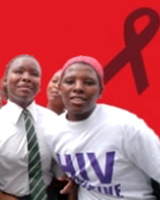Idasa-GAP and UNESCO assess HIV and AIDS coverage in journalism education
02-11-2010 (Windhoek)

© Idasa-GAP
The Governance and AIDS Programme of the African Democracy Institute (Idasa-GAP), in partnership with UNESCO, has developed criteria for assessing the approach to HIV and AIDS in journalism education and training institutions in South Africa. The assessment tool will be piloted at UNESCO’s potential centres of excellence in journalism education in South Africa in the next months.
The criteria are based on concepts that emerged from UNESCO’s experience in developing assessment tools for quality journalism education and Idasa-GAP’s experience in using communication approaches to connect HIV and AIDS prevention and treatment to the work of building democratic societies.
The new assessment tool was finalised following the workshop, organized in Cape Town last September by Idasa-GAP in partnership with UNESCO. The aim of the workshop was to start a wider discussion on how to teach journalists to cover HIV and AIDS in a way that focuses on the broader question of their role in democracy-building. The workshop explored the possibility of an ongoing partnership – a community of practice – to focus on innovations in journalism education.
“UNESCO developed a model curriculum for journalism education in Africa. This project is an effort to understand how HIV and AIDS could feature in this curriculum to respond to different needs in different countries,” says Jaco du Toit, from UNESCO’s Office in Windhoek. “HIV and AIDS is still a very real issue for most citizens on the African continent and this project is an attempt to prepare journalists to cover it in a way that could make a real difference in the communities’ response to the pandemic.”
Since 2002, Idasa-GAP has been collecting evidence to demonstrate the effect of HIV and AIDS on state institutions, state budgets and the ability of people to participate freely and actively in political processes. According to Marietjie Oelofsen of Idasa-GAP, the project with UNESCO will look at the potential of education to prepare journalists to generate a public conversation around HIV and AIDS. It will also consider the catalytic force of the media in enabling citizens to develop solutions to address HIV and AIDS and other development concerns.
The Idasa-GAP approach has three elements that frame HIV and AIDS as a development and democracy question. The first element relates to civic-capacity building emphasis that comes from understanding democracy as “democratic society”, not simply as a state system. A major challenge is to motivate and provide tools for communities to “own” HIV and AIDS and other development issues. The second element of the assessment tool relates to the analysis of the current status of media coverage of HIV and AIDS. The obstacle lies in the fact that journalism is often detached from most people’s everyday lives and aims largely at urban elites. The third element encourages open reflection by individuals and groups, as well as relationships with pioneers of democratic professionalism in African journalism.
As part of this project, Idasa-GAP also updated the existing UNESCO database of African institutions involved in teaching and training journalists. Information about 19 journalism schools was generated, including acceptance criteria, academic standing, links to media institutions, programmes and duration of courses.
The new assessment tool was finalised following the workshop, organized in Cape Town last September by Idasa-GAP in partnership with UNESCO. The aim of the workshop was to start a wider discussion on how to teach journalists to cover HIV and AIDS in a way that focuses on the broader question of their role in democracy-building. The workshop explored the possibility of an ongoing partnership – a community of practice – to focus on innovations in journalism education.
“UNESCO developed a model curriculum for journalism education in Africa. This project is an effort to understand how HIV and AIDS could feature in this curriculum to respond to different needs in different countries,” says Jaco du Toit, from UNESCO’s Office in Windhoek. “HIV and AIDS is still a very real issue for most citizens on the African continent and this project is an attempt to prepare journalists to cover it in a way that could make a real difference in the communities’ response to the pandemic.”
Since 2002, Idasa-GAP has been collecting evidence to demonstrate the effect of HIV and AIDS on state institutions, state budgets and the ability of people to participate freely and actively in political processes. According to Marietjie Oelofsen of Idasa-GAP, the project with UNESCO will look at the potential of education to prepare journalists to generate a public conversation around HIV and AIDS. It will also consider the catalytic force of the media in enabling citizens to develop solutions to address HIV and AIDS and other development concerns.
The Idasa-GAP approach has three elements that frame HIV and AIDS as a development and democracy question. The first element relates to civic-capacity building emphasis that comes from understanding democracy as “democratic society”, not simply as a state system. A major challenge is to motivate and provide tools for communities to “own” HIV and AIDS and other development issues. The second element of the assessment tool relates to the analysis of the current status of media coverage of HIV and AIDS. The obstacle lies in the fact that journalism is often detached from most people’s everyday lives and aims largely at urban elites. The third element encourages open reflection by individuals and groups, as well as relationships with pioneers of democratic professionalism in African journalism.
As part of this project, Idasa-GAP also updated the existing UNESCO database of African institutions involved in teaching and training journalists. Information about 19 journalism schools was generated, including acceptance criteria, academic standing, links to media institutions, programmes and duration of courses.
Related themes/countries
· South Africa
· Training of Media Professionals
· Weekly newsletter
· HIV and AIDS
Share this story:














